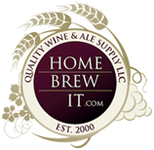Great Wine: It's All About the Water
Before you begin, every wine kit instruction booklet states that the winemaker should use good quality drinking water, and if one is not sure of the water quality, then he or she should consider using bottled water. Okay, youre only three sentences into the instructions, and youre already confronted with an obstacle that you hadnt anticipated; now youre full of doubt and projecting to the future, If I haphazardly make the decision to use my faucet water, will I be throwing away three months of winemaking, because I used the wrong kind of water? But fear naught, this is a simple obstacle to overcome, and we'll help you make a decision. First, Ill be covering the following types of water you could use in winemaking:
- Tap water - city or municipal filtered water
- Well-water
- Distilled water
- Bottled or purified (non-distilled) water
- Spring water
Tap Water - City or Municipal Filtered Water
Depending on your location, tap water may be as simple as walking over to your kitchen faucet turning twisting a knob. I define tap water as city-water that is pressurized to your house by your local municipality. Normally, as part of the water filtering and purification process, the water is chlorinated to keep bacterial levels low enough for human consumption. As an additional increase to standard of living, they also add fluorine salts to help the community fight tooth decay with the power of chemistry. Unfortunately, the chlorinated water that saves your life, kills your wine. If you can smell or taste chlorine in a glass of tap water, then you will also be able to smell or taste the chlorine in the wine. There are a number of ways to fight against the unwanted variables of tap water, but we simply recommend purchasing bottled water.- Our Suggestion: Do not use tap water for winemaking
Well-Water
Depending on your location, well water may be the only water source you have easily accessible. I grew up in the country and nostalgically remember lifting up on that red-handle water pump, waiting a couple seconds, and then getting a blast of the coldest water a human can experience. On the other hand, I also remember leaving a Ball jar full of well-water on the counter, returning only a half an hour later to clearly see a layer of rust particles gravitating toward the bottom of the jar. Sure, minerals are necessary for the yeast fermentation and growth process, but there can be, and most likely are, other particulates and organisms that can taint the winemaking process. For example, standard well-water test look for only certain types of bacteria and identifies your total coliform bacteria count. At certain levels, the well-water is safe for human consumption, but that does not mean it is safe for creating a great tasting wine. Nonetheless, if you have to use well water, we recommend that you get it chemically tested so that you know what youre working with. Most likely it will be high in iron and other hard minerals. So you will need to use activated charcoal filter to remove these particles. Moreover, silver-impregnated version of activated charcoal can help remove bacteria.- Our Suggestion: Do not use well water for winemaking.
Distilled Water
Distilled water is the result of a process of removing all the minerals from the water solution; this can be done via distillation methods or reverse osmosis. We dont recommend using distilled water during the kit winemaking process, there are key chemical elements that yeast uses in order to produce wine. The most important minerals are magnesium and potassium, which are important in the biochemical process of yeast converting sugars into alcohol, ethanol fermentation, and phosphate, which is necessary for yeast growth. If distilled water is the only type of water you have available, then you will need to add yeast nutrient to ensure the necessary minerals are in the solution for the yeast to operate properly. This is an easily avoidable additional step, just use a different type of water.- Our Suggestion: Do not use distilled water for winemaking.
Bottled or Purified (non-distilled) Water
Bottled or purified water that is non-distilled is normally the the suggested way to go. It is relatively inexpensive to acquire at large volumes, and after conducting some research on the brands of bottled water, you can be confident in the level of trace minerals and lack of contaminating elements.- Our Suggestion: Use bottled or purified (non-distilled) water for winemaking.
Spring Water
If you have access to spring water, which is normally chemical-analytically tested by the local government or community, and it contains the trace minerals needed for yeast to thrive, has no chlorine, fluoride, or other contaminants, which spring water normally fits this bill, they you have hit the jackpot. Depending on your location, you may have direct access to spring water, and you will be able to access it economically; however, if your location may require you to purchase it in bottle form, which can introduce unnecessary economical factors in your winemaking process. We recommend using spring water if it is chemically tested and easily accessible.- Our Suggestion: Use spring water for winemaking.

